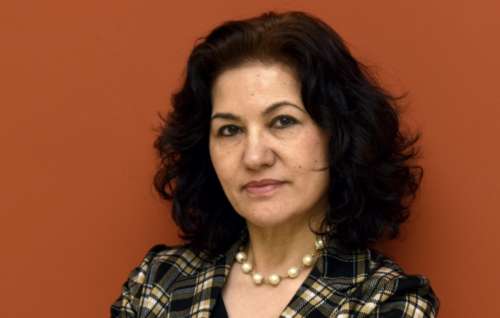In China, theater workshops place migrant women’s voices center stage
Theater workshops are essential sources of empowerment and support for migrant women in Chinese cities.

Note: All of the names used in this article are pseudonyms, for safety reasons.
It has never been easy to run an independent organization in China, especially for those working with marginalized social groups. In 2021 alone, more than 20 high-profile feminist social media accounts were shuttered amid a government clampdown on online feminist spaces and civil society more broadly. In the wake of the regulatory purge, non-governmental organizations (NGO) servicing Chinese women were left scrambling for survival. Some had to self-censor. Others closed their doors for good.
For migrant women in China, though, there were two exceptions, and both have paved a path to help the community in an unusual, personal, and creative way.
Nestled in the industrial Niushipu district of Shenzhen, Green Rose Workers’ Service Center 绿色蔷薇社会工作服务中心 is the city’s only NGO that specializes in migrant women services. The center’s main function is to provide something of a social agora, a space where migrant women can come together to build solidarity through community. But Green Rose also offers an unconventional touch: It hosts theater workshops, activities designed for members to build the requisite skills to navigate the myriad legal, emotional, and occupational issues that accompany migration.
Shenzhen has the highest number of migrants as a percentage of the city’s population in all of China, with nearly 68% of the city’s 12.59 million residents tagged with “migrant” status. Many of them leave their rural hometowns to find work in the factories that have fueled China’s export economy, often leaving children and spouses behind. Others migrate with family, but struggle to gain social security, education, and healthcare provision in their new urban homes.
While Chinese migration is especially difficult for both genders, migrant women experience further risk of sexual exploitation and labor abuse.
The women of Green Rose tend to work in Niushipu’s surrounding clothing factories. Grueling and often precarious working environments, as well as the relative isolation of Niushipu, make it difficult for them to access higher wages along with the comfortable standard of living that are pull factors to Shenzhen in the first place.
Despite the city’s reputation for a thriving social organization and charity sector, there is little support for the approximately 3 million migrant women in Shenzhen. Although Green Rose has used public performance to shed light on issues such as occupational injuries and sexual abuses faced by migrant women, their private theater workshops are more potent spaces for the women seeking solutions to their challenges.
The workshops encourage the women to role-play difficult life experiences, performing only among themselves and therefore forming an intimate setting that stimulates discussion of topics that arise through the performances.
One workshop participant, Xiùměi 秀美, once played the role of her son, who lives at home in Jiangxi Province with his grandparents. She acted out his resentment toward his parents for abandoning him in the countryside, his video game obsession, and how his complex emotions have resulted in disappointing grades at school.
Many mothers are aware of the repercussions of their migration. Fearing that job prospects in Jiangxi do not live up to her opportunities in Shenzhen, Xiùměi said, “I want to go home, but I work here…if the social security problem is solved, I will go home to my children and our family can be reunited.”
When rural residents migrate to other provinces, their household registration (hùkǒu 户口) stays with them. As a result, many migrants are denied basic public services that urban household registrants enjoy such as healthcare and education. Parents are often forced to leave their children behind when they migrate, as they are not entitled to an education in the places they are not registered.
In Xiùměi’s case, her lack of registration means she is not eligible for a pension and therefore can’t return home until she secures enough money to support her family into old age. By acting out the dilemma of balancing financial and familial stability among other women in similar circumstances, the group not only finds solidarity and comfort, but can unpack the issues they face in constructive ways. Drama, she suggests, “represents some of the problems in our society and helps people understand that those problems must be confronted.”

Drama is also being used elsewhere in China to seek constructive solutions to the challenges of migrant women. Huādàn 花旦, based in Beijing, uses Augusto Boal’s dramaturgical method of Theater of the Oppressed as the foundation for its theater workshops, in which a dilemma or difficult situation is acted out multiple times. Each time the scene is repeated, new participants switch out the characters to offer alternative responses to the same situation.
For example, one scenario was a case of workplace sexual harassment, a problem that has most recently come into public prominence following a breakthrough case at Alibaba. Participants were encouraged to act out a situation where the protagonist plays a worker who experiences sexual propositions from her boss. They repeated the scene multiple times, each time replacing the protagonist to introduce a new response to the situation. Some of the solutions the women acted out included aggressively turning the boss down, resignation from the job, and taking legal action. While it was made clear that there is no “correct” way to respond to sexual harassment, the benefits and pitfalls of each response were later discussed among the women themselves.
Participation in these workshops result in the collaborative development of a range of different reactions to difficult situations, with the aim of reminding participants that autonomy can be seized even in dire situations.
The scenarios explored by the Huadan workshops cover a wide range of issues. Beyond cases of workplace and domestic sexual harassment, they also cover disputes over workplace nonpayment and legal battles over household registration. Although the problems themselves cannot be stamped out through theater workshops, the activity reinforces the rights of the women and gives them the confidence to stand up for themselves.

The Beijing and Shenzhen workshops also open a space for further opportunities to engage with migration related drama. For example, members of Green Rose recently combined a theater workshop with a film screening of the 2018 movie Yun Jie, a coming-of-age story of a left-behind child in Hunan Province. The story resonated with many of the women and encouraged them to share their own experiences of family separation caused by migration.
One of the women, Qīngshān 青山, later reflected, “The film re-created my childhood and all the things I have experienced. My children are also left-behind children.” Sentiment among the group was sorrowful in light of their own memories. As another participant, Shūyàn 淑燕, suggested, “My own children are repeating the history [of left-behind children], but hopefully it will not happen again in the third generation.” Many pointed to the need to break the cycle in the future.
Whether the women perform in intimate settings within migrant communities, or engage with more mainstream stories of migration, theater workshops have become a powerful medium for them to capture the difficulties of migration while building a community with empowering potential.






